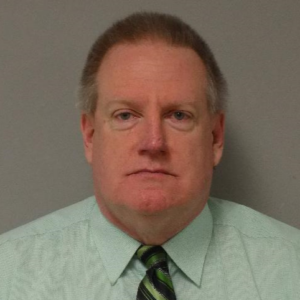Waupun warden, eight others, charged with crimes over inmate deaths

The Waupun prison sits in the middle of a residential neighborhood (Photo | Wisconsin Examiner)
The dust had yet to settle from the resignation of Waupun prison warden Randall Hepp when another bombshell dropped Wednesday. Hepp, and eight members of his staff, had been charged with crimes related to the treatment of people incarcerated in the prison.
During a press conference on Wednesday, Dodge County Sheriff Dale Schmidt, whose agency led the investigation, said Hepp and his staff had been informed of the charges and turned themselves in under orders from the sheriff. The nine prison officials were charged with abuse of residents of penal facilities and misconduct in public office, class I felonies that carry maximum sentences of three and a half years imprisonment.
For more than a year, Waupun prison has been at the center of a controversy due to lockdowns that have restricted inmate movement and limited access to outside time, phone calls, religious services and visits. Since June 2023, four people held at Waupun have died in the prison.
The lockdowns at Waupun, Wisconsin’s oldest prison, and Green Bay Correctional Institution, the state’s second oldest facility, have garnered protests across the state as advocates and people incarcerated have pushed for better care. Wisconsin Department of Corrections (DOC) officials have said the lockdowns were necessary because of a staff shortage.
At Wednesday’s press conference, Schmidt said he didn’t believe the lockdowns had anything to do with the deaths in the prison. With the lack of staff, the lockdowns should have made it safer for people in Waupun, the sheriff said, but instead a culture within prison staff led to “neglect” and caused the deaths.
The first of the four, Dean Hoffmann, died on June 29 last year. The Dodge County medical examiner ruled the cause of death was suicide by hanging. Hoffmann was transferred from the general prison population to the restrictive housing unit, more commonly known as solitary confinement, where he was not provided with the proper medications and not properly monitored despite a history of mental illness, the Wisconsin Examiner previously reported.
None of the prison officials were charged with any crimes related to Hoffmann’s death.
The second death occurred on October 2, when Tyshun Lemons overdosed on a substance containing fentanyl. Lemons was housed in the general population. No charges have been issued regarding his death thus far, said Schmidt, but he emphasized a need to increase security to ensure that no contraband is being smuggled into the prison. A separate federal investigation into the smuggling of contraband into the prison is underway.
Later in October, Cameron Williams died of a stroke at Waupun. Schmidt said that leading up to his death, Williams had several medical episodes. In the days before his death, Williams collapsed while being walked back to his cell and multiple staff members reported hearing him have loud, labored breathing. Williams later was seen lying unresponsive on his bed for hours, not responding even when guards banged loudly on the door.
The criminal complaint charges that in some cases staff didn’t report Williams’ health episodes to a supervisor or others. When staff did report the incidents to a supervisor, nothing was done, the complaint alleges. Eventually, a team of correctional officers to check on Williams was organized.
According to the portions of the complaint regarding Lt. Brandon Fisher, a nurse told investigators that she’d received a call from Sgt. Tanner Leopold stating that Williams was “not responding to them.” Leopold requested that she come to the cell and “verify that he is non-responsive so they can do a cell entry.” When she arrived, the complaint continues, “they knocked on the door, yelled, and looked through the trap.”
Williams was breathing, but unresponsive, lying on his back on a mattress on the floor. His feet were propped up on a desk on the cell’s far end, and his head was towards the cell door near the toilet. The nurse, Megan Leberak, recalled the area being “extremely hot,” but stressed that he was breathing. Later, she spoke with Sgt. Leopold in his office, and learned that correctional officers had yet to enter the cell. Leberak told investigators that this was out of the norm. “She didn’t understand why they called her over to verify that he was not responsive,” the complaint states. “She seem[ed] confused as to why they wanted her to come over because they (security) usually make the decision to go in and if there are any medical concerns, they then call her over.”
Leberak said later, she received a call at home that Williams had died. Sheriff Schmidt said during the press conference that his body had been undiscovered for 12 hours.
Three prison staff members have been charged for their role in Williams’ death: 50-year-old nurse Gwendolyn Vick; Fisher, 29, and Leopold, 27.
The fourth person to die in the prison was Donald Maier. Authorities said his death on Feb. 2 was due to dehydration and malnutrition.
As with the other deaths, Maier had been in the restrictive housing unit. Like Williams, he was found by staff long after his death. According to Schmidt, the medical examiner could not place Maier’s time of death, but rigor mortis had already set in by the time he was found.
Water had been shut off to the cell, a precaution that jails and prisons sometimes take to stop incarcerated people from flooding their cells. Formerly incarcerated people have recounted how such behaviors are often desperate calls for help. The Dodge County Sheriff’s Office investigators were unable to determine when the water was shut off, or for how long, because the prison’s written logs were unreliable, Schdmidt said, but the water “appears to have been shut off for a significant amount of time.”
Schmidt said that policies regarding hunger strikes and prison residents who refuse to eat — such as regular cell checks, aimed at ensuring they don’t starve to death — were not followed. The required number of cell checks were not conducted and supervisors knew that cell checks were commonly skipped, he said.
Correctional officers knew Maier, who suffered from mental health issues, was “deteriorating rapidly,” Schmidt said, but no medical staff had contact with the man. Supervisors were regularly updated about his condition, but did nothing, he said. Schmidt said Maier had not eaten in days and had taken to drinking sewage water and playing in the toilet. When Maier was found, his cell had a strong odor of bodily waste and filth, according to the sheriff.
Hepp, the warden, and six prison staff members have been charged in Maier’s death. Schmidt said Hepp was the person responsible under state law to care for the people in the prison; he has been charged with misconduct in public office for allegedly failing to perform his duty. Along with Fisher, correctional officer Jamall Russell, 39; Sgt Alexander Hollfelder, 31; nurse Jessica Hosfelt, 47; correctional officer Sarah Ransbottom, 35, and Sgt. Jeramie Chalker, 41, were also charged.
Schmidt said that the cases “have infuriated me,” but he also asked the community and the victims’ families to “remain calm.” Schmidt said he doesn’t feel there was malicious intent involved in the deaths, but called the deaths a case of “failure to do your job.”
All nine of the prison staff charged for their role in the deaths made their initial appearance in Dodge County Circuit Court on Wednesday.
Schmidt said he had a phone call in March with former DOC Secretary Kevin Carr about the poor culture at Waupun and the lack of care being provided to the people in the prison.
“We had a conversation about the lack of documentation,” Schmidt said, adding that he pointed out problems with the department’s internal investigations into the deaths, the lack of procedure being followed and other issues. When Carr pointed to staffing shortages as a major driver of the problems at Waupun, Schmidt said he told the DOC Secretary and former U.S. marshal that staffing is chronic across law enforcement and isn’t a valid excuse.
Three days after that conversation, Carr resigned his position as DOC Secretary. “I do not find that to be a coincidence,” said Schmidt.
Doing what’s required
Schmidt ended the press conference with recommendations to the DOC and to Gov. Tony Evers. He called for the prisons in Waupun and Green Bay to be either seriously renovated or closed down and replaced.
Prison abolitionist activists have called for the prisons to be closed down before. That option, however, could mean that a new prison would likely need to be built to accommodate the residents of Waupun and Green Bay.
Schmidt said that Evers appears reluctant to build a new prison. “I ask ‘why?’” said Schmidt. “It will save lives.”
The Sheriff also called on the DOC to hold itself to the same standards as jails. Each year, the DOC inspects jails to ensure that certain standards of care are being met. Schmidt said that the inspections have helped improve his own facility.
Although prison wardens are responsible for managing their facilities, he said, DOC prisons are not subject to similar inspections. Schmidt said legislation could change that, while security measures such as body and thermal scanners could help detect contraband.
A troubling reality
As of May 31, the prison in Green Bay housed 1,057 people — 40% more than its capacity of 749.
The Waupun prison is intertwined with the identity of the surrounding city. While it houses 712 people in a prison designed for 882, Waupun is the state’s oldest prison, built in the 1850s. Its outdated design, and chronic staffing shortages, have led to growing concerns about the facility’s ability to keep its residents safe.
Attorney Lonnie Story, who has brought wrongful death lawsuits on the behalf of Hoffmann’s family and other inmates, says has received disturbing reports from numerous other men incarcerated within Waupun and Green Bay.
Story told the Wisconsin Examiner he was not surprised by the resignation of Hepp so soon before the charges, adding that what the Dodge County Sheriff’s investigation discovered in Waupun, “was astonishing, disturbing, disheartening. Some of it was even vile to them.”
The arrests “kind of substantiates what I’ve been alleging all along,” Story said. “And in several ways, it also validates what my clients have been putting forth, even though the [DOC] and the Department of Justice has fought back against us quite, quite harshly.”
Story said that the decision to sue over prison conditions “did not have to happen” had the DOC officials and others offered to meet and resolve the issues at the prisons. “Nevertheless, they took the attitude that it would be better to just litigate this thing, ad infinitum.”
The pain left behind by the deaths is impossible to cast aside, the attorney said. Despite Schmidt’s belief that the lockdowns did not cause the deaths, Story contends the prison lockdowns have led to further deterioration in conditions at Waupun and Green Bay, “including the deaths of three of my clients.”
He said he thinks about “the families, their loved ones — one [prisoner] committing suicide, one [dying of an] overdose during the lockdown, and the other [dying from] stroke that could have been…he could have been saved.”
Without the litigation, which is still ongoing, “I don’t think that this light would have come to be so brightly shown on all this bad behavior,” Story said.
Evers and DOC speak up
In a statement issued Wednesday, Evers called for the investigation to continue. Evers said he has ordered the DOC to continue its internal investigations.
“There must be accountability and justice,” he said. “And I believe accountability and justice insist that both internal and law enforcement investigations must continue until they have been exhaustively and thoroughly completed.”
At the sheriff’s department press conference, Schmidt cast doubt on how thorough DOC’s internal investigations are. Evers said he was directing the DOC to release the results of its internal investigations to the Dodge County Sheriff’s Office upon their completion.
“Each and every person who’s failed to do their job to the high level that we expect or treat people in our care with the dignity, humanity, and respect they deserve should be held accountable to the fullest extent of the law — it’s that simple,” said Evers. “We have an obligation to make sure that people in our care, officers and staff, and our communities are safe. And the criminal justice system must hold every wrongdoer to account.”
DOC Secretary Jared Hoy — who has been at the helm for just two weeks — said the department has cooperated with the Dodge County Sheriff, and that he has asked the Dodge County Sheriff to keep its investigations open as the department concludes its own inquiry.
“Maintaining the safety of people in our care and staff, as well as local communities, continues to be the DOC’s top priority,” Hoy said in a statement. “Ensuring accountability for every individual who fails to uphold the DOC’s high standards of conduct is a critical part of safety and security both within our institutions and beyond them, and we appreciate the Dodge County Sheriff’s Office’s efforts toward this important goal.”
Hoy said more than 20 people remain under internal investigation launched by the DOC in March 2023. Nine people — who have not been charged criminally — are no longer working for the department, he said, “at least eight” are on administrative leave as a result of DOC’s probe, and more people may yet be placed on leave or referred for criminal charges based on investigations by the DOC or other law enforcement agencies.
GET THE MORNING HEADLINES DELIVERED TO YOUR INBOX
The post Waupun warden, eight others, charged with crimes over inmate deaths appeared first on Wisconsin Examiner.






